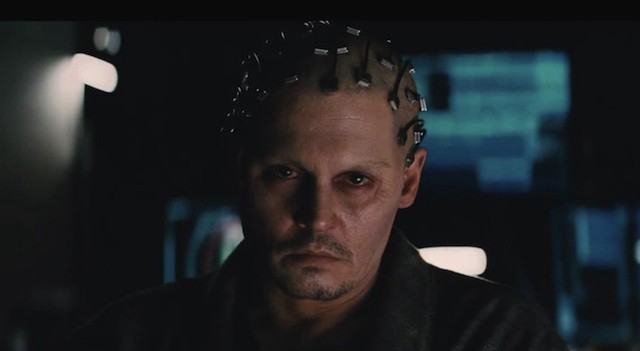 (2 / 5)
(2 / 5)
As grand themes go, self-awareness is certainly one of the grandest. Descartes’ famous proposition “I think therefore I am” is arguably the foundation of all Western philosophy.
After all, without self, without thought, there can be no perception therefore no knowledge. The questions that inevitably follow – “What do I think?” and “Who am I?” – are similarly the basis for most drama. They’re certainly the basis of Transcendence, which grounds itself in the genre trappings of science fiction (or something close to fact…)
Transcendence follows computer scientists Will and Evelyn Caster, whose experiments into artificial intelligence make them the target of a dangerous anti-technology group known as RIFT. When Will (Johnny Depp) is mortally wounded in an assassination attempt, Evelyn (Rebecca Hall) sees a chance to “save” him by uploading a digital copy of his consciousness, despite the concerns of their friend Max (Paul Bettany). As Max points out, there is no way of knowing if the entity created would truly be the Will they know or something new and dangerous.
The film initially styles itself as a technological thriller, but it finds its focus in the relationship between Will and Evelyn. When “Will” comes online and speaks the name of his wife, it’s truly a shiver-down-the-spine moment, with what it means for both her and for the advancement of humanity. However, Evelyn’s desperation not lose the quirky, brilliant man she loves – Depp appropriately on autopilot – leads her to take risks that come to justify Max’s concerns and, to an extent, the RIFT’s ruthlessness.
First-time director Wally Pfister shows the visual acuity that has marked his career as a cinematographer. A frequent collaborator of Christopher Nolan’s, he has an eye for drawing out the small moments, like the recurring image of water droplets falling, a motif that is, however, never fully developed. As the project begins to sprawl, Transcendence loses its focus on the interpersonal, trying instead to replicate the same emotional stakes on an epic scale. Morgan Freeman, Cillian Murphy, and Kate Mara are reduced to plot devices, lost amidst the carnage.
Unlike the best of Nolan’s blockbusters – say, Inception – Transcendence loses track of what it’s supposed to be about. The technology itself, be it quantum processors or nanotechnology, is only interesting for what it says about us. Based on a Black Listed script by Jack Paglan, the film certainly isn’t lacking in ambition or timeliness – in reference to other films/TV shows with comparable premises, it’s perhaps best summed up as Spike Jonze’s Her meets CBS’ Person of Interest (created by Chris’ own brother, Jonathan Nolan).
Ultimately, Transcendence ends with mixed signals: it can’t quite decide whether technology is destined to be mankind’s downfall or savior. As worried as the characters are about identity, it’s ironic that the film loses track, deigning to service the plot at cost to the themes.
Striving perhaps, for ambivalence, Transcendence manages only unnecessary ambiguity; life imitating art as in both, seeking to comprehend those imponderables, man’s reach exceeds his grasp. In the end it’s all just a bit Lawnmower Meh.
